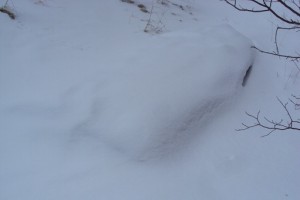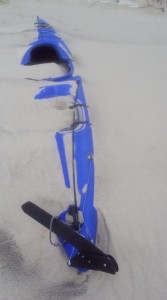The other day when Mary and I were walking onto the beach near my home, we noticed a bulge in the snow-covered dune about twelve feet long and four feet wide. What could be hiding there?
This beach is completely empty during three out of four seasons, used only during July and August. Summertime families store small sailboats and kayaks on the beach, tethered to posts driven into the sand. Netted bags of toys, low beach chairs and sand buckets are left, too, a testimony to the honest character of those using the beach.
Summer swimmers have no formal supervision, no life guard on duty, and we’re all fine with that. But what would happen in an emergency? Could people on the beach quickly reach a drowning swimmer if necessary? Would they be willing to dive in and try?
Thankfully that scenario hasn’t come up, but if it did, we have an ace in the hole: the lump under the snow. It’s an aluminum row boat lying bottom-up on the sand, currently out of sight like a hibernating bear. But come summer, the snow will melt and the boat will show itself, reminding us we have a way to rescue someone in crisis.
God sometimes operates in a similar way. Although he has a variety of solutions for our various rescue needs, he often keeps them covered until we’re desperate. (At least that’s what it seems like from our perspective.) When we’re desperate, we call to him for help, and that’s the key. If we don’t call, he may not rescue.
A recurring theme in Scripture is people recognizing their need for help, then acknowledging that God is their Source for it. If we search for help everywhere but in him, he’ll let us try to get it done on our own. When we acknowledge we can’t make it apart from him, he comes out of hiding.
Last fall when Jack and I walked the beach, I noticed a blue kayak still lying on the sand near its post well after all the other boats and items had been removed. I thought someone would eventually come for the kayak, a pricey-looking boat.
As September and October came and went, the autumn winds picked up, and gradually the kayak filled with sand. By Thanksgiving it was all but covered over, and before the first snow fell, it was completely hidden.
Now, it’s not even a lump. I believe I’m the only one who knows it’s buried there. If the owner arrived to retrieve his boat today, he’d sweep his eyes across the beach and say, “Someone must have taken it.” To his understanding, it would be gone.
Is this what happens to God’s rescue if I don’t appeal to him? Does he keep his plans a secret? I believe he often does. Knowing this, I’m motivated to dialog with him, cry out to him, recognize his role as my rescuer on a daily basis. He’s invited me to do this, specifically mentioning me by name, and I’d be a fool not to accept this invitation.
And in July, if someone posts a notice looking for a blue kayak, I’ll know what to do.
“I will give you hidden treasures, riches stored in secret places, so that you may know that I am the Lord, the God of Israel, who summons you by name.” (Isaiah 45:3)





